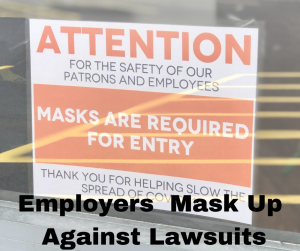Small businesses face a dizzying swirl of regulations from different levels of government about whether patrons and employees are required to wear masks during the pandemic, as well as whether employers are required to either purchase masks for employees or reimburse them for reasonable costs.
The scenario becomes more fraught given the emergence of class-action litigation even when businesses are complying with the mandates and guidelines from the federal, state and local authorities. Going forward, small businesses need to strike a delicate balance between accommodating customers in their public spaces while doing right by their employees, whose priorities are not always the same but should be considered.
Customer Suits Under ADA
The Americans with Disabilities Act has given rise to some of this litigation, on behalf of store customers. These suits have been based on Title III of the ADA, which holds that businesses must provide public accommodations to persons with disabilities.
One claim, filed against Nike, Inc., alleges that the company stores’ mask policies discriminate against the hearing impaired because they impair the ability to read lips and other visual cues, leading to embarrassment and deprivation of friendly, personalized customer service.
Another suit, filed by more than 60 plaintiffs against Giant Eagle, Inc., and C&J Grocery Co., LLC, says the Giant Eagle grocery chain’s requirement to wear masks while shopping violates the rights of those with respiratory problems, asthma, nervous system challenges, post-traumatic stress disorder and other conditions.
The suit notes that the CDC has agreed medical exceptions may need to be made to mask requirements. The statewide mask order in Pennsylvania, where Giant Eagle is based, also includes a medical exception. But Giant Eagle says they are offering curbside pickup, delivery and personalized shopping for those who would rather not wear a mask, and medical experts have said most asthma and anxiety patients can safely wear them.
Citizens in Florida, Washington state and Louisiana have filed legal challenges to mask ordinances, and the Louisiana case resulted in a temporary restraining order preventing local authorities from enforcing the mayor’s mask mandate against a group of local businesses in Shreveport, La.
These lawsuits are a reminder that in imposing mask requirements, businesses are ill-advised to take a one-size-fits-all approach. Instead, they should have some flexibility and consider what feasible accommodations they can make for customers with disabilities, including contactless services, to balance ADA requirements and pandemic precautions.
Employee Suits Around Unsafe Practices
Lawsuits from employees have been more likely to lean in the pro-mask direction, alleging unsafe working conditions during COVID-19. When remote work isn’t feasible, employers should think about being flexible about return-to-work policies and provide reasonable accommodations for higher-risk people as well as thoughtful logistics for everyone.
Employees and their family members filed a class action in Illinois state court that claimed McDonald’s had been negligent and created a public nuisance through its protocols around masking. The suit claims that some workers do not wear masks regularly and that employees were only provided with one apiece, which became filthy before too long.
The court partially granted an emergency motion for a preliminary injunction that found some McDonald’s outlets were neither enforcing their own mask policies nor complying with the state mask requirements handed down by Governor J.B. Pritzker. The court order required the McDonald’s subsidiary to enforce mask wearing policies when employees are unable to socially distance by six feet and train them on how to social distance to comply with the state mandate.
These dueling sets of lawsuits might seem to leave very little middle ground where small businesses can satisfy everybody. But business owners should consult with counsel to figure out what policies and procedures they need to institute to walk the fine line.
 Chicago Business Attorney Blog
Chicago Business Attorney Blog


